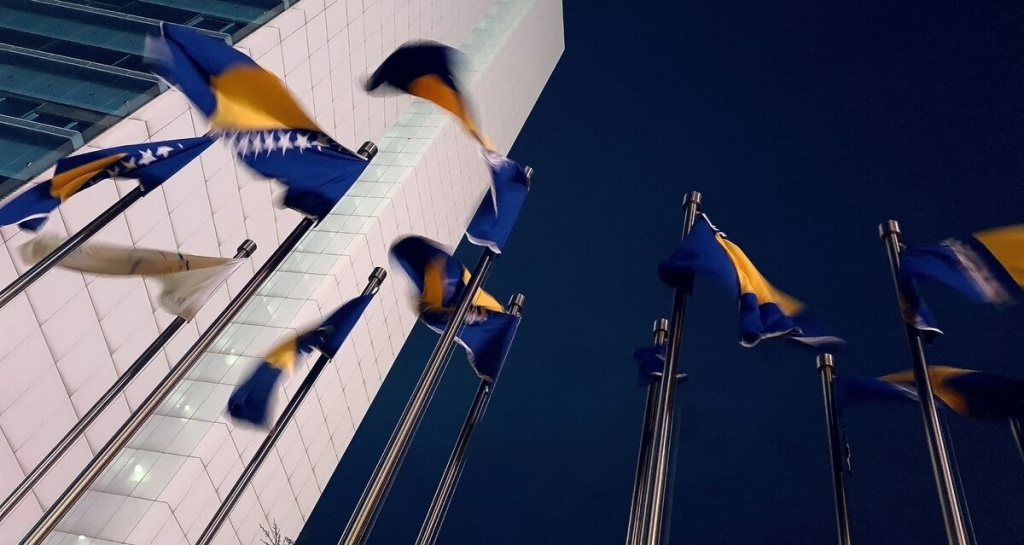Possibility of a New War in Bosnia and Herzegovina
In
Log in if you are already registered
While the world is focused on the crises taking place in Ukraine and Palestine, another region is showing signs of growing instability: the Balkans. Specifically, two key areas in the Balkans – Bosnia and Kosovo – have yet to be permanently stabilized, even after the wars in the nineties. However, while in Kosovo tensions remain at bay and the possibility of a major conflict not eminent, in Bosnia and Herzegovina the situation is quite different.

Source: AFP
This country, whose sovereignty is protected by international efforts, particularly the High Representative for Bosnia and Herzegovina, is showing increasing signs of an impending crisis. Bosniaks have repeatedly violated the Dayton Peace Accords, infringing on Serb freedoms – particularly of those living in the Republic of Srpska – with the partial support of the international community, especially the US. As a result of the Dayton Accords, a single sovereign state – Bosnia and Herzegovina – was agreed to be composed of two parts: the Serb-populated Republika Srpska and the mainly Croat-Bosniak-populated Federation of Bosnia and Herzegovina. This division is the only reason why the Serbs agreed to the treaty. Following the signing of the accords, Bosnia and Herzegovina should have adhered to all that was laid down in the agreement, yet with every day, this proved not to be the case.
Initially, after the start of the breakup of Yugoslavia, Serbs from Bosnia and Herzegovina wanted Belgrade to remain their capital and not have the Drina River become part of the border between Bosnia and Herzegovina and Serbia. In other words, Serbs were against dividing Serbians from Serbia and Serbs from Bosnia and Herzegovina. Such sentiments continue to be shared to this day. However, under strong pressure from NATO – including a two-week bombardment against the Army of Republika Srpska, after which the Bosniak-Croat offensive against the Republic of Srpska began – Serbs were forced to give up their inital goals and demands. They accepted to remain part of Bosnia and Herzegovina on the condition that they will maintain high autonomy and de facto independence, thus signing the Dayton Peace Treaty of 1995. Despite moments of tension and pressure exerted by the High Representative for Bosnia and Herzegovina (a de facto US-imposed colonial administrator), peace and progress have been more or less constant in the multi-ethnic state.
However, dark clouds have once again gathered over Bosnia and Herzegovina. Aggressive policies by Bosniak political leaders, including their political and religious establishment, have immensely played a role in facilitating these rising tensions. Bosnian and NATO forces – who saved Bosnia from complete defeat during the war – have not given up their initial goals: the abolition of the Republic of Srpska and the complete unification of Bosnia and Herzegovina that would force Serbs and Croats to be subordinate to them. Escalation has increased to the point where Bosniak politicians are threatening Serbs with ethnic cleansing, a terrifying reminiscent of the Baltic’s brutal past.
In light of growing tensions, the President of Republic of Srpska recently announced that the parties should return to the Dayton Peace Agreement and insisted on its observance. In turn, a political crisis has unfolded in Bosnia and Herzegovina, intensifying tensions further. Even if President Dodik's proposal can permanently calm the situation in Bosnia and Herzegovina, aggressive Bosniak political plans only threaten to escalate the conflict further. As proof, a Bosnian National Council press release – that can be seen as an invitation to reignite the conflict – stated: “Secession is not possible and will mean a coup d'état, and by default this implies a return to the Constitution of the Republic of Bosnia and Herzegovina. If one of the extremists still dares to open this Pandora's box, let him know that citizens and patriots will not stand by and wait for a new genocide to happen”.
It is important to note that behind the Bosnian National Council, i.e. in its management structures, there are war cadres and former high-ranking officials that are part of the Bosniak political scene, from former president of the Islamic Community in Bosnia Mustafa Cerić and founder and first President of the Party for Bosnia Haris Silajdžić, to Ejup Ganić (who was accused of war crimes in Dobrovoljačka), Bakir Alispahić, Sefer Halilović, Mirnes Ajanović, and others.
Among the series of threats directed at the Serbs by Bosniak politicians, Bosnia and Herzegovina Defense Minister Zukan Helez’s stands out the most. In a television appearance, he announced that the Bosnian authorities, considering the UN Srebrenica Resolution, will request the abolition of the Republic of Srpska and divide the Republic into two cantons and erase its name forever. Recalling the actions taken by the Croatian army in operation "Storm", where almost all Serbs were expelled from Croatia, Helez proposed that all Serbs should leave Bosnia and Herzegovina.
In response, President of the Republic of Srpska Milorad Dodik stated, “Helez's threats to the Serbs and the Republic of Srpska show what kind of fate the Bosnian politicians intend for us Serbs, but Serbs will not be silent about it”. In other words, Bosnian threats against Serbs are far from jokes, as data on the revival of their military industry and armament speaks volumes. For example, Igman – a weapons factory under the complete control of the Bosnians – has acquired new machines a few years ago. Since then, the production capacity of Bosnia and Herzegovina has greatly increased, particularly with 7.62mm ammunition. Currently, Igman employs over 1,400 workers who work continuously, even double shifts, to boost production.
With the planned restoration of old machines and the introduction of a third shift for Igman workers, the current capacity and number of employees is planned to increase. Igman’s current daily production capacity reaches approximately 700,000 pieces of ammunition for various calibers (9mm to 12.7mm). Additionally, Kalashnikov automatic rifles are also being produced at the Igman military factory.
Igman General Director Đahid Muratbegović has also circulated the idea of opening a new plant to produce ammunition for calibers using 20, 25 and 30mm bullets. In addition to all the above, last month, a Turkish military transport plane – A400M Atlas (REG: 18-0094) – transported military equipment to Sarajevo three times over a span of thirty days, building up a military that surely implies an impending conflict is close. To better understand how alarming current the situation is, it is also important to note that Igman once needed two years to produce the required volume of weapons to have the amount that was required during the war in the nineties. Today, however, Igman can produce the same amount in a little more than a hundred days.
Additionally, in the last two years, NATO has carried out more than fifty reconnaissance missions, with airplanes flying over the skies of Bosnia and Herzegovina, but more predominantly over the Republic of Srpska. Bosniak threats of war and ethnic cleansing have yet to be condemned by NATO and no statements condemning Bosnian hate speech have been issued.
The reason why NATO and the US embassy in Sarajevo remain silent on the matter is because the Republic of Srpska is the only remaining obstacle to Bosnia and Herzegovina’s ability to join NATO. According to the Dayton Accords, the Republic of Srpska has veto rights, thus important decisions cannot be made without the consent of the Republic of Srpska’s leadership. The leadership, in addition to its people, strongly oppose joining NATO and are in favor of maintaining ties with Russia.
Overall, growing military buildup and rising tensions sends a clear message to Serbs and its political leadership: Either agree to terminate the Dayton Peace Accords and the break apart the Republic of Srpska, or there will be a new military conflict and possible ethnic cleansing.
During such difficult times, the choice for Serb and Serbian leaders in Bosnia and Herzegovina is simple: The path currently led by President Dodik must be continued. If the leadership were agree to peacefully abolish the Republic of Srpska, Serbs will disappear, as exemplified with the experience of Kosovo, where even during times of peace, evidence of ethnic cleansing was apparent. Therefore, the Republic of Srpska must invest in stronger defense and security measures, but also abide to the Dayton Accords. To do this, there must be a significant investment in Srpska’s defense forces, including its police and the Gendarmerie of the Ministry of Interior of Republika Srpska.
Regarding the Republic of Srpska’s military capacity, NATO forcibly abolished Srpska’s military after the war, under the pretext that there will be no more wars. However, with military developments intensifying in the Federation of Bosnia and Herzegovina, the Republic of Srpska must find means to respond to growing tensions for the sake of not only the survival of the Republic, but also all those living in it.
Master's degree in historical sciences, Independent analyst, Montenegro
Blog: Slavisha Batko Milacic's Blog
Rating: 0




